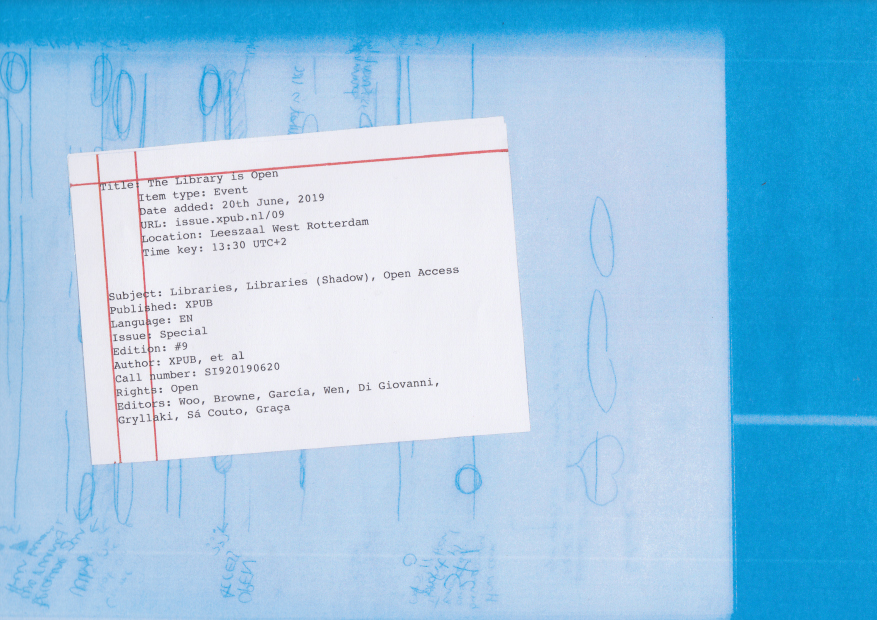Special Issue 09 / Introduction
The Library Is Open (Introduction)

In the spring and summer of 2019 we developed The Library Is Open, a publication which focuses on the operations, actions, and roles of legal and extra-legal libraries. Central to this project is the community that forms around a collection of texts – the custodians of the collection and the readers. The Library Is Open is the result of the third iteration of Interfacing the Law, an ongoing research project between XPUB and Constant (BE), which explores issues around extra-legal libraries, software and legal interfaces and intellectual property. Led by our guest editor Femke Snelting, we participated in many activities which were organised by invited guests:
With Bodó Balázs, an economist and researcher on shadow libraries, we analysed the gargantuan dataset of Library Genesis, to determine trends which indicate access to texts and the social, geopolitical and economic aspects at play.
With Anita Burato and Martino Morandi at the Rietveld Library in Amsterdam, we discovered the subjectivity of subjects and thorny issues of classification and representation.With other readers, we deepened our understandings of texts through collective annotations.
With artist and researcher Eva Weinmayr, who introduced us to The Piracy Project, we examined the possible motivations and differences between pirated books and their “source”. With open-source software such as Tesseract, pdftk, and LibreOffice (and many others) we explored the technical processes used during the creation of pirate libraries, and the hidden labour involved in this.
With fellow pirates, we considered the multiplicity of roles and activities involved in maintaining various libraries, such as Monoskop, Library Genesis, aaaaaarg, Sci-Hub, Memory of the World, Project Gutenberg, +++.
With Dušan Barok, the administrator of Monoskop and an alumnus of the Piet Zwart Institute, we discovered how Monoskop was initiated and how it has changed over time.
The variety of our collective sessions, and the practical exercises we performed led us to organise an afternoon of three workshops that directly address the active role of piracy, rather than simply talking about it. Encouraging small, informal, collective actions, we wanted to challenge the ordinary, hierarchical presentation of research projects in the academic context, and individual notions of authorship. When choosing a suitable venue for our event, we decided to ask Leeszaal (in Dutch “Reading Hall”) to host our workshops. Situated in a busy, multicultural area of Rotterdam, Leeszaal exemplifies many values we sympathise with, particularly open access to knowledge, and a focus on the community that uses the space, not just for reading but for many other social purposes. These values we recognise (somewhat nostalgically) as reminiscent of public libraries of yesteryear. However, the landscape today is quite different, with huge online commercial repositories of texts (e.g. JSTOR), protected by paywalls which limit access to them, and in response the emergence of “shadow libraries”. In a printed publication of the same title we documented the dilemmas, outcomes and reflections that came out of our three different workshops, and interviews with people whose work is at the centre of the issues that each workshop uncovers.
